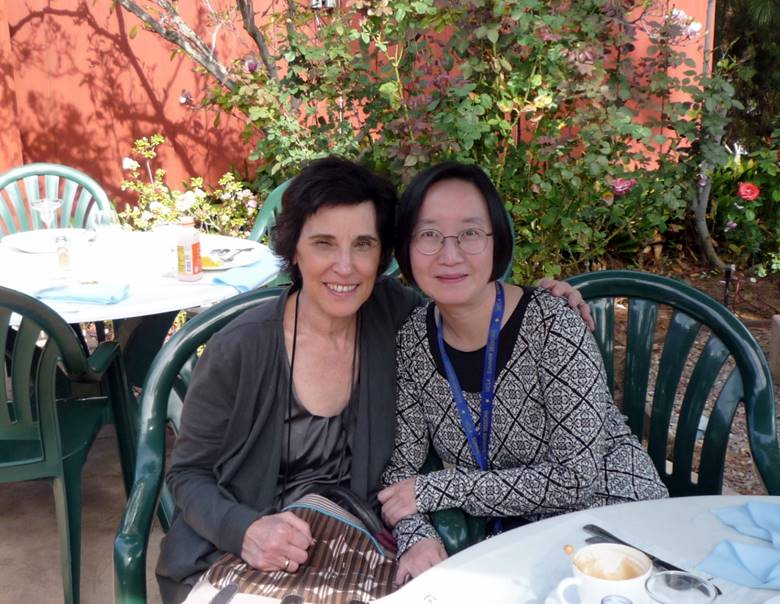
[Photo taken October 2010, UCLA]
Agnes He
November 2017, Long Island, New York
I studied with Elinor as a doctoral student at UCLA many years ago (1988-1993) and have been fortunate enough to benefit from her warmth and wisdom ever since. Everything I write about and care about today has its origin in Elinor’s teaching. Every accomplishment of mine can be traced to Elinor’s inspiration.
I recall that the first homework assignment from Elinor’s class was to identify the stance-making linguistic devices in a piece of text. It was one of the most memorably enjoyable assignments from all my long years of education in four different universities and three different countries!
We all know that Elinor writes most prodigiously and poignantly – on this occasion, I’d like to highlight an article that she co-authored with Bambi (Schieffelin) which is not the most frequently cited but which has had a lifelong impact on me, “Language has a heart” (1989, Text). That piece satisfied my deep yearning for something beyond the structure of language, something born of the structure of language. (Part of the impact can be seen in the title that I have given to the book I am completing -- The Voice of Immigration.)
I remember vividly Elinor’s reaction to my dissertation proposal. She asked me, Agnes, who are you writing this for? Why are you writing this? I want to hear your own voice. She impressed upon me that scholarship is not a mere display of one’s knowledge and talent but a pursuit of matters of the heart! This credence has since served as my basic academic moral compass.
At an early stage of my career, I was forced to face the challenge of family – it seemed inevitable that in order to be with my husband to start a family, I would need to give up my first tenure-track Assistant Professor position, and with no other job prospect in sight. Before finalizing this high-risk career move, I sought the advice of several people whom I respect. Everyone offered me prudent warnings about the possible implications of such a move for my long-term career and pledged warm support for whatever decision I would eventually make. Elinor was the exception. Her response was unequivocal: If you love him [my husband], join him. Life is larger than a tenure-track. Even if you cannot find another tenure-track, there are other great things you can do, for sure. With her encouragement, I made the bravest decision in my career ever.
Toni Morrison says, “… We do language. That may be the measure of our lives.” From Elinor, I have learned that language is not only the measure but also the means of life. Languaging affords human possibilities for doing, being, feeling, imagining and becoming. Hence in a deep and fundamental way, Elinor has given me a powerful lens to assess and appreciate the activity, creativity, complexity and beauty of human development.
Through her own commanding example, Elinor has inspired me to cross disciplinary boundaries. Today I see myself as an applied linguist--a social scientist, asking humanistic questions about what it means to be a global citizen. One of my proudest professional achievements is the founding of the Center for Multilingual and Intercultural Communication at Stony Brook University (stonybrook.edu/mic), which has created synergy among faculty across departments and disciplines as we ask and address questions about language, mind, culture, identity, and community in the context of linguistic and cultural contacts, conflicts and convergences.
Elinor has also shown me how to mentor others. Her mentorship extends beyond providing feedback to my writings (professional and personal), promoting my career advancement, and sharing her insights on my life events over all these years. She shows her care and concern in a way that is both profound and piercing, that goes directly to the core. She always makes me feel that it is the person, not the paper, the publication, or the position that truly, ultimately, matters. I am now at a stage where my junior colleagues look up to me as a role model. I think the best way to honor Elinor’s mentorship is for me to mentor others the same way she has mentored me.
But most importantly, Elinor has taught me the importance of the heart. Not only does language have a heart, but language researchers do, too. From her, I have learned that intellectual matters cannot and should not be separated from those of the heart. Follow your heart, find your own voice, and pursue your goal with courage, devotion, and discipline -- in this regard, Elinor’s own example is unsurpassed. She makes academic matters human and beautiful. A consummate agent of socialization, she has inspired me to study the soul of language and to seek the sense of life.
Dear Ellie, when I think of intellectual elegance, when I think of academic brilliance, when I think of personal warmth, when I think of passion of the mind and possibilities of being, I think of you. I know you know this already, but let me say it again: you have had an enduring impact on how I think and what I write. And most importantly, I shall remain forever grateful to you for teaching me that “It is all a matter of hearts”! con molto affetto, agnes
